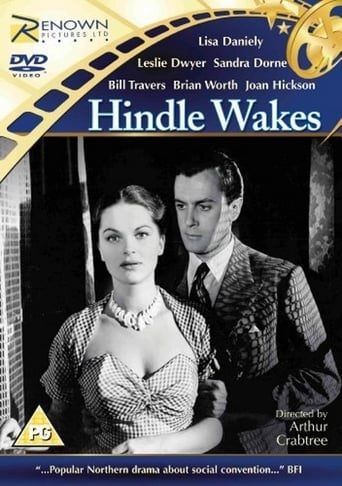Laikals
The greatest movie ever made..!
ScoobyMint
Disappointment for a huge fan!
SpunkySelfTwitter
It’s an especially fun movie from a director and cast who are clearly having a good time allowing themselves to let loose.
Taha Avalos
The best films of this genre always show a path and provide a takeaway for being a better person.
i_ashworth
I could only give this eight because I only watched half an hour of it, but what a laugh! I loved every brief minute. It was nostalgic, with its depiction of a Blackpool in its heyday, and I guffawed heartily at the cut-glass accents of the mill-workers. Paul Whitehouse could not parody this, because it does the job itself. The raised eyebrows from the concierge when the unmarried (gasp!) couple book into the Llandudno hotel as Mr and Mrs are priceless. I look forward to seeing the film in full so as to discover if there is a moment to top the scene at the swimming pool. Let me set it: you have two brylcreemed Lotharios at the open-air baths in hot pursuit of the two ladies they met at the Winter Gardens the night before. The ladies - in their demure fifties fashion - spot them and make haste to flee the gents' advances pronto. They retreat to where no gent may set foot, and when Gent 2 asks Gent 1 where did they go, Gent 1 points to the sign about the womens' changing room that reads: "Ladies' Boxes". PRICELESS!! How keen we gents are to get into ladies' boxes. What-ho!
trimmerb1234
Extraordinary that there had been two silent and one talkie versions earlier - a testament to the strength of the original play. It raised the, for its time, very controversial question of "The Single Standard": should women have the same freedoms as men? By 1952 however the boldness and independence of the central character's actions had been largely overtaken by changes in society especially the sexual licence during wartime, consequently it had lost its controversial edge.In this production the drama revolves more round the parents - they were of a generation that still held to Edwardian values even if their offspring didn't. Shorn of its controversial edge but retaining the questions of differences of class or rather money, the part that does remain is a well played modest domestic drama involving the parents. As another reviewer has pointed out the Lancashire mill girl daughter speaks and dresses like a débutante, indistinguishable from her upper class love "rival" - film companies apparently at the time obliged actresses to lose all trace of regional or working class accents. Small wonder the revolution of kitchen sink realism in play and film occurred within less than 4 years.The earlier versions including the silent ones are rated higher than this probably because they were closer to the time when the story would have been controversial and highly charged. However now is probably the time for a period revival with its theme of a strong and independently minded working class young woman defying convention and self-interest.
Stefan Kahrs
One would watch this film today more out of historical interest, i.e. as a document of its time, than as a piece of entertainment. It shows the moral standards of the time (and how they were changing) and the way people used to have fun. This was visibly pre-television. One of the depicted ways to have fun features so prominently that I suspect an early form of 'product placement' - the Wintergarden in Blackpool.Most characters of the film are nauseatingly stereotypical (with a pre WW2 feeling - they seem dated even by 1952 standards), the only exception being the female lead. Sadly though, Lisa Daniely's accent is ridiculously posh for a supposed working class girl.On the plus side, the film has a more realistic feel than most of its contemporaries. This is a consequence of the real world settings and because the director refused to glamourise anything; clothes, sets, behaviour all appear real - there are also no cop-outs at the end.

